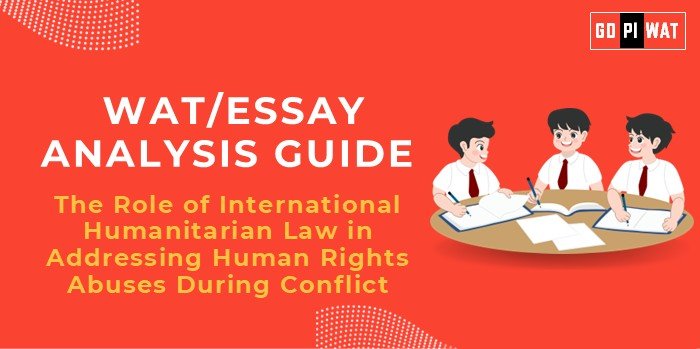📋 Written Ability Test (WAT)/Essay Analysis Guide
🌍 Topic: Understanding IHL’s Importance in Human Rights Protection During Conflicts
📖 Understanding the Topic’s Importance
💡 International Humanitarian Law (IHL) provides the framework for protecting human rights during armed conflicts. Despite its universal ratification, challenges in enforcement persist, making it a critical topic in global governance and human rights discussions.
🕒 Effective Planning and Writing
- ⏱️ Time Allocation:
- Reading & Planning: 5 minutes
- Writing: 20 minutes
- Reviewing: 5 minutes
- 📚 Word Count Distribution (500 words):
- Introduction: 70 words
- Body: 360 words
- Conclusion: 70 words
✍️ Introduction Techniques
- ⚖️ Contrast Approach:
“While the Geneva Conventions promise universal protection during war, countless civilians in Syria and Yemen remain unshielded from brutality.”
- 💡 Solution-Oriented Approach:
“Strengthening international humanitarian law mechanisms offers hope amidst rising human rights violations in modern conflicts.”
📚 Structuring the Essay Body
- 🏆 Achievements:
- Global ratification of the Geneva Conventions by 196 countries, highlighting universal acceptance.
- Prosecution success in international tribunals, such as those addressing Rwanda’s genocide.
- ⚠️ Challenges with Comparative Analysis:
- Lack of enforcement mechanisms, especially in non-international conflicts.
- Comparative analysis of post-genocide Rwanda’s legal success vs. the ongoing humanitarian crisis in Syria.
- 🌏 Future Outlook:
- Increasing role of technology in monitoring compliance and documenting war crimes.
- Strengthening partnerships between governments, international organizations, and NGOs for better enforcement.
🔑 Concluding Effectively
- ⚖️ Balanced Perspective:
“IHL is indispensable but requires stronger enforcement for meaningful impact.”
- 🌍 Global Comparison:
“Comparing Rwanda’s post-conflict success to Syria’s ongoing struggles highlights the gap between ratification and action.”
📄 Sample Short Essays (100 words)
- ⚖️ Balanced Perspective:
“International humanitarian law provides a framework for human dignity during war. While its successes include global ratification and war crimes prosecution, implementation gaps persist, particularly in non-international conflicts. Stronger enforcement and technological integration are vital for future efficacy.”
- 💡 Solution-Oriented:
“IHL’s potential to mitigate human rights abuses depends on enhanced accountability mechanisms and NGO collaborations. Leveraging technology to document violations can empower international courts and deter offenders.”
- 🌍 Global Comparison:
“The disparity between Rwanda’s tribunal success and Syria’s unresolved atrocities underscores the need for equitable enforcement of IHL provisions.”


